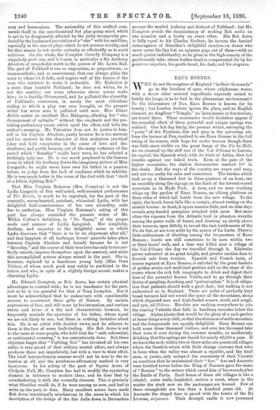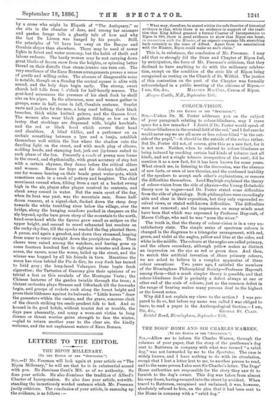EAUX BONNES.
WHY do not the coughers of England "in their thousands" go to the loveliest of spas, where sulphurous water, with a dozen other mineral ingredients expressly suited to fortify the lungs, is to be had in the pleasantest environment To the hibernators of Pan, Eaux Bonnes is known for its beauty ; but London doctors ignore the place, and no English chemist, no Anglican "Temple," no lawn-tennis or fox-terriers, are found there. These necessaries would doubtless appear if the remedial effect of these powerful and unique springs was realised. One hot day lately, the present writer, surveying the " ports " of the Pyrenees, dim and grey in the quivering air, from the terrace at Pan, resolved to see Eaux Bowies in the full swing of its season, with hope for cooler breezes though there was little snow visible on the great fangs of the Pic du Midi. As we steamed up the stiff rise of the Val d'Ossan to Laruns, its capital, the Spanish wind, with its hints of Africa, blew hot breaths against our baked train. Even at the gate of the higher mountains, the station thermometer marked 900 in the shade. But the ways of the country are suave and easy, and not too costly for calm and conscience. The landau which took us up a thousand feet in three-quarters of an hour, ran as smoothly along the zigzags on the flank of the torrent-scored mountain as in Hyde Park. A turn, and we were cracking whips up the garden of Eaux Bonnes, an oblong platform on three sides of which tall hotels form the new village. To the right, the beech forest falls like a curtain, almost resting on the storied houses in front, it opens massive folds, and on clear days reveals grey-headed precipices streaked with snow. But more often the vapours from the Atlantic trail in phantom wreaths among the green walls of forest, and drawing up slowly above their terraces, open fitfully to reveal the vast battlements of the Pic du Ger, or are torn aside by the spears of La Latte. There is little enthusiasm of climbing among the frequenters of Eaux Bonnes ; izards are still sometimes to be seen within two or three hours' walk, and a bear was killed near a village of the Val d'Ossan the day we travelled through it. Edelweiss grows unhunted at no great height, and greater rarities dare to flourish safe from tourists. Spanish and French taste, of course regnant at Eaux Bonnes, is satisfied by the great baskets of golden arnica and medicinal gentian sold on the steps of the rooms where the sick folk congregate to drink and digest their dose of the powerful Source Vieille, and to go through their duties of gargling, douching, and "pulverisation." It is of obliga- tion that patients should walk a good deal ; but walking is not understood as in England. There are miles of perfectly kept broad terraces laid out round the spurs of the mountains, along which slippered men and high-heeled women stroll, and cough, and spit, ad libitum,. Rivulets are rushing everywhere to join the roaring Valentin that falls in headlong cascades below the village, Alpine plants that would be the glory of a rock-garden at home fringe every cleft, so that the distances of noble mountain and the foregrounds are equally delightful. Eaux Bonnes can hold some three thousand visitors, and over ten thousand take their turn of cure during the summer months, so assiduously drinking that the springs are leased for nearly 26,000 a year. If we leave the mob, within two or three miles are quaint old villages where the Ossalois retain with little change customs that were in force when the valley was almost a republic, and the head men, or jurats,.only accepted the suzerainty of their Vicomte • on condition that he maintained their "fors." Aas and Assouste were fortified towns before the King of Navarre gave the name of " Bonnes " to the waters which cured him of his wounds after the Battle of Pavia. Each house of these old villages is like a citadel; outer walls, loopholed, enclose a court, where in the winter the stock now on the pasturages are housed. Few of these strongholds are less than a hundred years old. At Assouate the chapel floor is paved with the tombs of the Da Livrons, seigneurs. Their decrepit castle is now possessed
by a crone who might be Elspeth of "The Antiquary," as she sits in the chamber of deas, and among her sausages and garden forage tells a ghastly tale of bow and why
the last De Livron was hanged by his people. Still, the principles of '93 have less sway on the Basque and Ossalois slopes than elsewhere. There may be need of newer lights in forest and water economy, but the habit of thrift and labour endures. The hardy women may be met carrying down great blocks of frozen snow from the heights, or spinning better thread on their distaffs than steam-jennies can turn out. The very excellence of the Eaux Bonnes arrangements proves a sense of gentle and willing order. The absence of disagreeable noise is notable, though on a Sunday the central square is alive with sound, and the holy days begin early. The strong, sweet church bell tolls from 5 o'clock for half-hourly masses. The goat-herd announces the presence of his sleek flock by shrill airs on his pipes. In the afternoon, men and women gather in groups, some in half, some in full, Ossalois costume. Scarlet vests and jackets for the men, a long scarf belting their black breeches, thick white knitted gaiters, and the Gascon beret. The women also wear black gaiters fitting so low on the instep that stockings are dispensed with, bright kerchiefs, and the red or black hood which covers their bead and shoulders. A blind fiddler, and a performer on an archaic something between a lyre and a banjo, establish themselves well within the line where the shadow cuts the dazzling light on the street, and with much play of elbows, nodding heads, and stamping feet, jerk out jig-tunes suited to each phase of the fun. Presently a ronde of young men forms in the crowd, and rhythmically, with great accuracy of step but with a certain shyness, they dance before the critical elders and women. Races for boys and for donkeys follow, and one for women bearing on their heads great water-pots, which sometimes ends in a crash of pottery and laughter. The chief merriment ensued when, tilting from a cart at a bucket swung high in the air, player after player received its contents, and slunk away soused in water. But the main sport of the day, when its heat was past, was the mountain race. Some half- dozen runners, at a signal-shot, flashed down the steep drop towards the white tumbling river below the village, over the bridge, along the hanging meadows pushed in chequers on the alp beyond, up the bare green steep of the mountain to the north, band-over-band while the figures grew small as midges on the upper height, and seemed to crawl exhausted but resolute on the rocky sky-line, till the specks reached the flag planted there. A pause, and again a gunshot, and down they streamed, leaping from Bestir to scaur straight down the precipitous slope. Then cheers were raised among the watchers, and having gone up some fourteen hundred feet in eighteen minutes and down in seven, the racers, none the worse, tailed up the street, and the winner was hugged by all his friends in turn. Meantime the moon has risen behind the Pic de Ger, its rosy flush has turned to livid grey ; the long-faced Velasquez Dons begin fresh cigarettes ; the Tartarins of Gascony give their opinions of so trivial a feat as this escalade of the Montagne Verte ; the Chinese lanterns of the garden twinkle through the trees ; a blatant orchestra plays 'Strauss and Offenbach till the fireworks begin, and groups of rockets rush along the forest height and prove their littleness against its bulwarks. "Little horses" draw the gamesters within the casino, and the grave, sonorous clock of the church striking ten sends prudent folk to bed. And so housed in its good hotels, without tourist fret or trouble, the days pass pleasantly, and many a worn-out victim to lung disease or throat worries gains strength to face the winter, —glad to return another year to the clear air, the kindly welcome, and the not unpleasant waters of Eaux Bonnes.



































 Previous page
Previous page